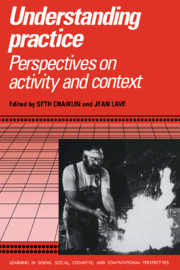Book contents
- Frontmatter
- Contents
- Series foreword
- List of contributors
- Part I Introduction
- Part II Learning craftwork
- Part III Learning as social production
- 8 Examinations reexamined: Certification of students or certification of knowledge?
- 9 Beneath the skin and between the ears: A case study in the politics of representation
- 10 The acquisition of a child by a learning disability
- 11 Context and scaffolding in developmental studies of mother–child problem-solving dyads
- 12 Solving everyday problems in the formal setting: An empirical study of the school as context for thought
- 13 Teacher's directives: The social construction of “literal meanings” and “real worlds” in classroom discourse
- Part IV Conclusion
- Author index
- Subject index
- Learning in Doing: Social, Cognitive, and Computational Perspectives
8 - Examinations reexamined: Certification of students or certification of knowledge?
Published online by Cambridge University Press: 06 January 2010
- Frontmatter
- Contents
- Series foreword
- List of contributors
- Part I Introduction
- Part II Learning craftwork
- Part III Learning as social production
- 8 Examinations reexamined: Certification of students or certification of knowledge?
- 9 Beneath the skin and between the ears: A case study in the politics of representation
- 10 The acquisition of a child by a learning disability
- 11 Context and scaffolding in developmental studies of mother–child problem-solving dyads
- 12 Solving everyday problems in the formal setting: An empirical study of the school as context for thought
- 13 Teacher's directives: The social construction of “literal meanings” and “real worlds” in classroom discourse
- Part IV Conclusion
- Author index
- Subject index
- Learning in Doing: Social, Cognitive, and Computational Perspectives
Summary
Examinations are a popular object of criticism. In Scandinavia, the yearly examinations in schools and at universities are accompanied by recurrent public debates over their meaning and value. At student protests the examinations are often a target of critique: They may be dismissed as invalid, the grading as subjective and unreliable, the examination situation artificial and oppressive. The attitude of researchers is reflected in the titles of some publications listed in the references to this chapter (Cox, 1967; Stimpel, 1969; Ingenkamp, 1971; Bourdieu & Passeron, 1971; Kvale, 1972; Miyazaki, 1976): “Resistance to change in examining” (Great Britain); “The irrationality of the examination system at German universities”; “The questionable value of grading” (Germany); “The illusion of equal opportunity” (France); “Examinations and power” (Norway); “China's examination hell.”
In spite of broad and well-documented critique, examinations and grading procedures generally remain unchanged. The question to be pursued here concerns whether the critiques of examinations as invalid could possibly be based on an invalid understanding of what is evaluated at examinations. Two conceptions of examinations shall be debated: a predictive test of a student's career versus a constitution and a censorship of knowledge.
What is evaluated by examinations – students or knowledge?
Evaluation of students or of knowledge – a figure–ground reversal
To evaluate means to establish the value of something. In order to investigate whether an evaluation is valid, it is necessary to ascertain what is evaluated at an examination and why. An examination is an evaluation of a student's knowledge.
- Type
- Chapter
- Information
- Understanding PracticePerspectives on Activity and Context, pp. 215 - 240Publisher: Cambridge University PressPrint publication year: 1993
- 10
- Cited by



